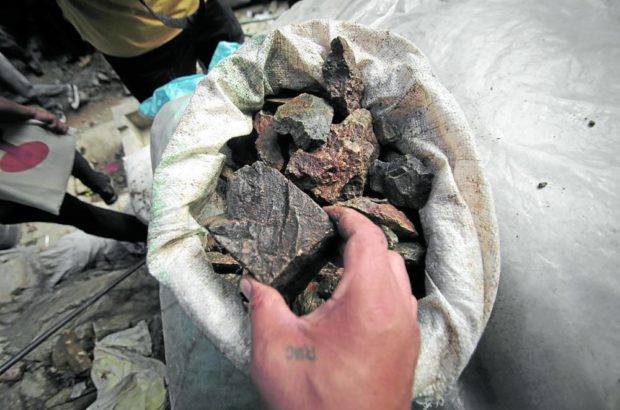
ORE | These are samples of mineral ore that are often extracted by pocket miners in the outskirts of Baguio City and Benguet province. This year, a coalition of small-scale miners is asking Congress to outfit the People’s Small-Scale Mining Act of 1991 with new safeguards so they can proceed with their livelihood. —RICHARD BALONGLONG
BAGUIO CITY, Benguet, Philippines — A renewed demand for changes to the 31-year-old law legalizing the country’s artisanal and small-scale miners got much-needed support from officials of the Bangko Sentral ng Pilipinas (BSP) and the Mines and Geosciences Bureau (MGB) last week.
The National Coalition of Small-Scale Miners of the Philippines, in an assembly held here on July 28 and July 29, laid out a set of amendments and proposed new provisions for the People’s Small-Scale Mining Act of 1991 (Republic Act No. 7076) to uplift the lives of an estimated 500,000 pocket miners all over the country.
Noel Malimban, BSP north Luzon cluster director, said updating and improving RA 7076 would “open up more access to finances for miners.”
Small-scale miners generate gold that is sold directly to the BSP, he said.
Efren Carido, MGB director for Soccsksargen region (formerly Central Mindanao), and Alfredo Genetiano, MGB mining department chief for the Cordillera, also expressed support for the amendment of RA 7076, during a July 29 news conference organized by the coalition.
In the last 30 years, many pocket miners still toil underground without licenses because the government required them to put up a Minahang Bayan and the associated licensing contracts have been laborious and expensive, said Rogelio Data Jr, a mine leader from Camarines Norte. “They always risk being arrested and jailed or forced to pay the authorities in order to get a pass,” he said.
“There are too many requirements which are impossible for us to comply with because it would need so much money,” said Panfilo Luis, a mine leader from Agusan del Sur. He added: “Government should understand that [small-scale mining] is not a commercial enterprise, but a family’s livelihood.”
Indistinguishable
Mindanao mine leaders said that some of their organizations spent up to P10 million to secure a Minahang Bayan. In the Cordillera, where indigenous Filipinos have been panning for gold as far back as the 19th century, only 13 Minahang Bayan have been approved in the course of 30 years but many of them are yet to operate because the necessary pocket mine contracts have not yet been perfected.
Part of the problem, the coalition leaders said, was that government regulators treat small-scale miners as distinct from large-scale mines, but have applied requirements that are barely indistinguishable from those given to large-scale mining operations.
“For example, why does MGB require IP (indigenous people) miners to secure a free, prior, and informed consent (FPIC) from their own communities? Wouldn’t that be like the IP miners giving their own selves permission to operate the Minahang Bayan?” said Leoncio Na-oy, president of the Benguet Federation of Small-Scale Miners.
The FPIC prerequisite is normally applied to big miners developing sites inside ancestral domains, so one of the coalition’s proposals is to form regulations suited for small-scale mine operators, Na-oy said.
MGB is working out an exemption for IP miners from the FPIC requirement, Genetiano said.
Need for equipment
RA 7076 also prevents pocket miners from using heavy equipment that would protect them when they extract ore from small tunnels.
“For MGB Cordillera, we want the law’s definition of small-scale mining to be amended. The law may create a category for medium-scale mine operations that would capture some small-scale operations which use equipment,” Genetiano said.
“In previous small-scale summits held in Baguio, miners wanted to be given the right to use explosives and chemicals because some of them have training especially for former employees of big mines … I used to be a small-scale miner so I am aware of your problems,” he said.
—VINCENT CABREZA
RELATED STORIES
DENR chief calls for review of mining law in PH
Mining Group asks gov’t to close all small-scale mines until rules are corrected

